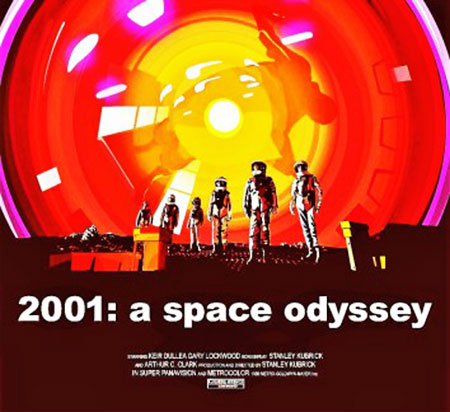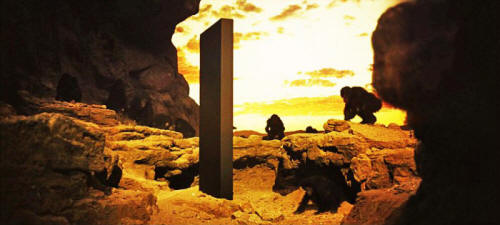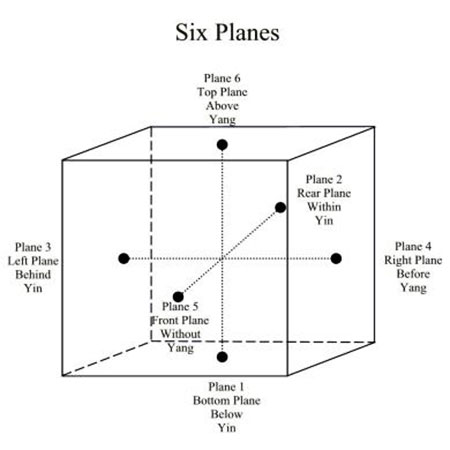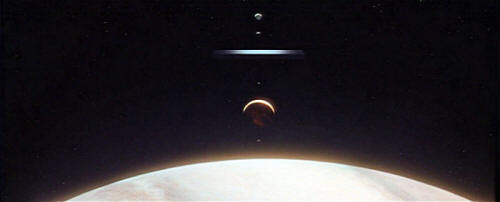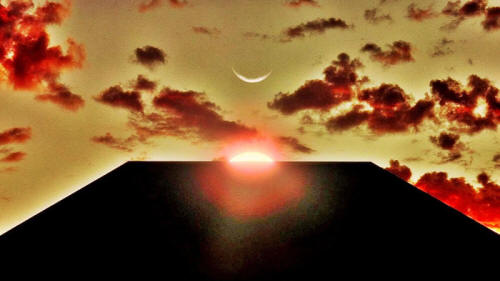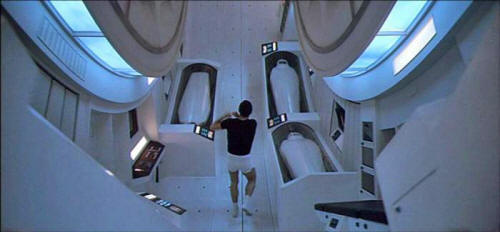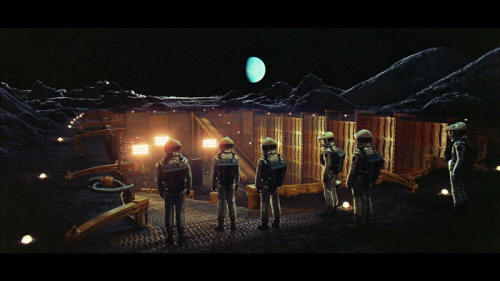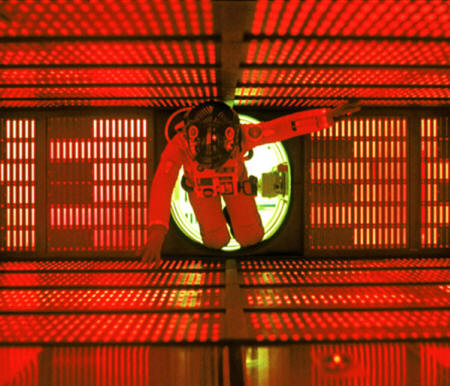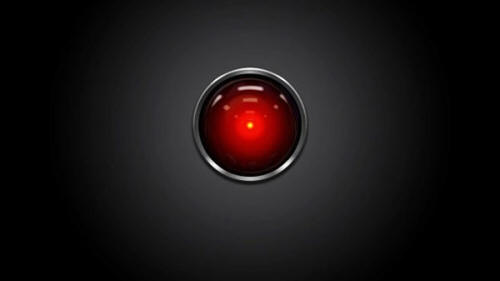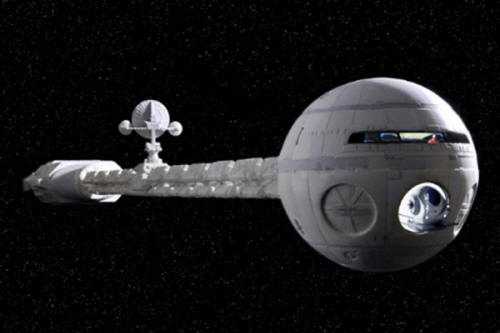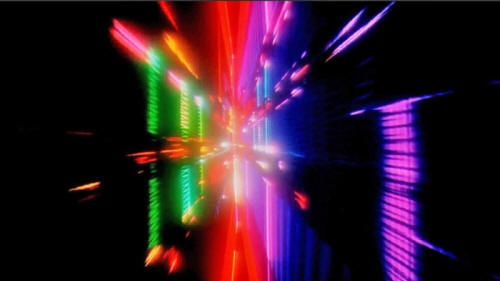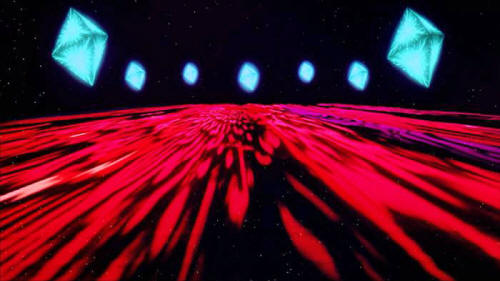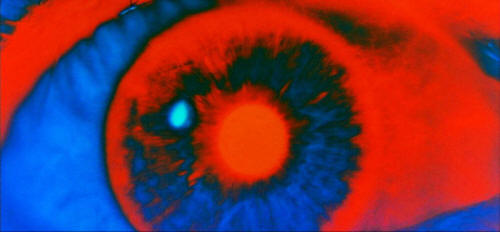|
from
JaysAnalysis
Website
Hyped up super 70s poster.
Not only were the technical advances monumental, it was also a film that was uniquely philosophical. Prior to 2001, most science fiction had been relatively cartoonish, with little attention to esoteric and alchemical themes, aside from scant instances.
And that is precisely what 2001 is - an alchemical slash philosophical presentation of the supposed evolutionary ascent of man from primal, animalistic ape into reborn Starchild, an initiatory process that purports to unfold through eons of brute, meaningless time, culminating in a series of revelations associated with stellar alignments that "awaken" a new stage in the process.
Along the way, Kubrick includes a host of ideas and themes that I will exegete below.
Ultimately, my thesis is this:
In the opening sequences we witness a few crucial elements:
The setting is a dry, dusty landscape of sparse vegetation and tribes of apes shown in confrontation over a watering hole.
The planetary alignment signifies to the viewer a new eon is emerging for man, the so-called dawn of consciousness. Primal and savage, the apes pre-signify Kubrick's perspective on the totality of human history, centered around resource wars.
With the advent of the monolith, composed of a wholly other, angular and sleek form, it is completely out-of-place among the sprawl of vegetation and natural, geological formations that make up the apes' environment.
Kubrick uses, as many
now know from Weidner's documentary, the technique of front-screen
projection, which allowed for a highly realistic way to shoot these
scenes in a convincing way, and the possibility that NASA and the
CIA were interested in this technique for media deception in
relation to the moon landing is not without evidence.
As the apes are thrown into a frenzy, the monolith stands stark and cold as something both extraterrestrial, yet inviting. The largest ape lurches forward to touch the monolith, and as a result we see the development of what Kubrick and Clark appear to conceive of as "consciousness," correlated with techne, but not merely techne, it is technology as an extension of space and power - warfare.
The bone the ape uses to
bash the skull of the other ape suggests a radical "survival of the
fittest" mythos in the pure Darwinian sense, revealing a radical
version of process philosophy that finds commonality with Darwin,
Haeckel, and Marx, and even suggests the dialectical determinism of
the Eastern Bloc Marxists like Lenin, Mao and Trotsky, all of whom
have explicit treatises on the metaphysical presupposition of
Marxism, being perpetual flux.
I
am not saying Kubrick is certainly some committed Marxist, his films
do consistently present class warfare, elitism and oligarchic
deviance and control.
Human consciousness is an evolutionary process that emerges from the deus ex machina, an apparently emergent god(s) incarnated in symbolic form in the monolith itself, the black, angular cube that appears to descend from the gods to initiate the new stage.
While the monolith is extraterrestrial, it does not appear to be other than the universe, but an aspect of it.
In fact, as a form of a cube, the monolith seems to embody space itself. This is partly my unique thesis - that the point, line, extension, terminus of geometrical space, which then combines again to create another point, line, plane and terminus, is the basic geometric form that represents spatial relations.
In our level of reality, you note that there are only 6 possible directions one can take at any point:
These six directions are thus a geometrical box or cube, as explained by the Pythagoreans (and Platonic solids) long ago. So the cube, and in particular the black cube from outer space, is space.
2001 is
therefore about this dimension, in totality, that expresses itself
primarily in two fundamental ontological realities - time and space.
I find both agreement and disagreement with Ager and Weidner, and as I argued in my Eyes Wide Shut analysis, the screen itself is being utilized as a kind of talisman through which the audience is intended to be taken on a ritual initiation process.
Thus, I agree with both the monolith is also a screen, and in fact, in the original screenplay, the monolith was planned to be a screen that would project images to the apes so they could learn warfare, etc, and move on to their next stage of monkey madness.
Though the TV monolith was dropped, the seeds of that idea are still present, as more than once in 2001 the viewer sees the monolith extend, grow and approach the viewer, ultimately encompassing the entirety of the screen.
The monolith also suggests an obelisk or the Islamic Kaaba stone (a purported meteorite!), and on an esoteric level we can recall the masonic obelisk, a divine phallus, and connect it to the notion of the generative principle found in sex magick and the traditional indigenous conception of the personification of the natural reproductive forces of nature embodied in a phallic or vaginal symbol or totem.
This is key, as Kubrick will later link the monolith/obelisk directly to womb, semen and birth processes when we come to Bowman's trippy space trip and Starchild.
The monolith is consciously "Luciferian," prompting man to a Promethean new eon each time it appears, and always connected to technological advance through the "sacrifice" of warfare.
"Hey baby, what's your astrological monkey sign?" The monolith in planetary alignment.
I am reminded here of the paleo-technology idea in writers like Dr. Joseph P. Farrell, who posits a kind of "technology of the gods" possibly possessed by ancient man from which the myths of the "golden age" descend.
I have written elsewhere concerning the fact Homer's Iliad does, in fact, present Achilles' magical shield as a kind of TV screen with moving images that presents the entire history of the Greeks.
This connection is not tangential, as Homer also recorded the oral tradition of Odysseus, and it is Odysseus who will be the primary literary source for the film's title and later protagonist in astronaut Bowman.
Bowman will be a new Odysseus, who traversed the underworld and back, as Weidner correctly notes, who will go on a journey like none other.
With Ager, his analysis leaves out many of the esoteric elements, while aptly expositing the more technical and cinematic features, and in Weidner, there is a lack of criticism of the process philosophy, simply adopting Kubrick's "alchemical" presentation as if it were the next Shakespeare, and subject to no naysaying on the part of the incoherencies of the nonsensical philosophy presented as reality.
At this juncture it is worth again highlighting the failures of Neo-Darwinian process philosophy I mentioned above.
Darwinism, and its philosophical corollary in figures like Hegel, Marx, Whitehead and Teilhard de Chardin, are simply assumed as a given, with absolutely no critique allowed, and it should be noted that Hollywood presentations like 2001 were central in helping to solidify this mythology as an orthodox dogmatic given.
As I've related many times, the masses get their worldview from movies and music, not books and bureaucrats, and nothing helps to solidify a paradigm in the minds of men than a big blockbuster sci-fi flick. And there is no question that 2001 unquestioningly and uncritically adopts the Darwinian mythos into its story narrative, but this is highly illustrative.
As I have argued for many years and in many articles, what you see in 2001 and figures like Teilhard de Chardin is the propagandist indoctrination of perpetual flux, process philosophy.
And on top of that process philosophy is a dash of alchemical and occult mystery wherein man will ultimately obtain apotheosis (which will be detailed below).
The uncapped pyramid showing the incomplete nature of the "Great Work."
There are some problems, though with perpetual flux philosophies, the most notable of which is the fundamental contradiction of such systems of philosophy being entirely anti-systemic.
In other words, to construct an abstract philosophical system composed of invariant conceptual entities (ideas), that one believes describes a world of perpetual flux, is a glaring contradiction. Indeed, we may simply ask why the supposed invariant logical concepts and ideas that make up the descriptive system are not subject to constant flux?
If they are, the "process philosophy system" is immediately made nonsensical, and even if there were a justification for how this might be, the secondary problem is just as devastating - how do these abstracted concepts and ideas apply and "stick" to objects in the world that are perpetually in flux?
The dualism cannot be reconciled, and is made incoherent before it can even get off the ground as a viable system.
I have highlighted this elsewhere as what I call the lack of a unifying, objective metaphysical principle and Dr. Philip Sherrard has critiqued this same notion in his essay on Teilhard.
This is interesting, as the mistake many make is to place the film in a scientistic scheme of rationalistic, natural process, when as we will see, the presentation is far more occult, where it is the planetary gods who are leading man through his planetary ascent to apotheosis through technology.
Cyclical wheels in space. Hamster man Bowman.
This is not to say the film is transhumanism, per se, though that notion is lurking below the celluloid surface.
As the monkey's bone ascends into the air, Kubrick bypasses the totality of human history into the space age, where we see what he termed the "machine ballet" of floating space stations and ships docking onto great wheels that recall the Hindu "Wheel of Time" or Ezekiel's "Living Wheel" Cherubim.
The cyclical ballet will evoke Nietzsche and his "eternal return" as later in the film we will hear "Thus Spake Zarathustra," the work in which he presents this doctrine. The doctrine of eternal return is the classical western perspective that history is cyclical and destined to repeat its events with fatalistic certainty.
Is Kubrick saying that man has already experienced all he has experienced on the karmic wheel of time, and the destiny of the gods mandates that this process will culminate in a transmigration of souls resulting in a star child that is now the god of its own kosmos, which is merely a projection of its psyche?
I think this is a very possible reading of Starchild and the Genesis sequence at the close of the film, where the galaxies and God himself becomes, as I said, merely a deistic entity subject to the temporal alterations and flux the rest of the universe undergoes. While this is likely, I will also present another possible reading below.
Upon the station, we learn about the mysterious loss of communications through a nod to Cold War dialectics that Kubrick extends into the future.
Curiously, the nation states are not eliminated, as the US and Russia still remain dominant players. This suggests Kubrick did not conceive of the future as one where international communism would succeed in eliminating nation states, yet the geopolitical chess game of nations has now extended into the galactic, as the US base at Clavius on the moon has gone dark.
As a cover story, the US government has concocted the old favorite - a bio release pandemic, leading to "quarantine."
In actuality, the lunar explorers have uncovered the monolith, this time submerged intentionally for the precise time that man would advance in his technology to reach the moon and discover the monolith's "signal" transmission to Jupiter.
"Turn that damn thing down, it's too loud. This Jupiter song sucks!"
As we watch the gradual, elegant movements of the ships in these scenes we are inclined to see a sexual component of extension, opening, entrance and release, indicating the evolutionary progress of man has ever been a dialectic of war and sex, and sex is a kind of savage war.
Man has seeded his offspring and now man will begin to extend his member into space, and seed the galaxy. Techne is his extender for this endeavor once again, providing the ship and means by which he may project himself further in space.
As the ship ejects the pod carrying the astronauts and later Bowman, we are given a clear example of phallic insemination and watchful students of Kubrick will recall his frequent reference to "bodily fluids" in all his films.
As the astronauts inspect the monolith, we hear a demonic cacophony of voices that harmonize to produce a kind of buzzing reminiscent of bees.
Man's next stage in his evolutionary ascent is once again related to his discovery and touching the dark divine monolith, which emits a loud sound of high pitch frequency that disturbs and disables the explorers.
We are, I think, supposed to think the monolith is connected to higher spheres and the frequencies at which all reality "vibrates," from matter, to sounds, to light.
The Moon monolith is vibrating a powerful frequency that is connected to Jupiter, intent on leading man as a kind of mile marker to his next location in the galaxy as the planets once again align in this sequence to reveal the uncapped pyramid.
"Where do you tear the floppy discs out of this POS?"
The uncapped pyramid in the alchemical sense signifies the lack of completion of the "Great Work," the grand plan to transmute base matter in to "gold," which signifies both the inner journey of the psyche in its ascent back to God or the soul to the One (in Neoplatonism), or the after-death journey of the gnostics through the planetary spheres.
In the macro sense, the Great Work is the transformation of the entire universe in to the Omega Point of Teilhard or Hegel, where the totality of reality becomes conscious of itself as conscious, and inanimate matter becomes merged into the psyche, realizing its own potentiality and god-in-process (from here, you can see how we are leading up to Starchild).
Whereas with the apes, early supposed "man" was highly limited and caged, bound by the forces of nature, time and space. In the space age, man has overcome gravity, floating about the universe, no longer hindered by the limitations of hunger, resources and mass.
This is the middle stage of man's gradual ascent out of the cage - the box - of time and space, which is precisely what the monolith signifies in part (this is also why the monolith becomes a kind of coffin-box for Bowman in the climax).
For Kubrick, the "evolutionary ascent" is premised on the presupposition of perpetual "progress" through technology in overcoming the limitations of time, space and the body.
Hunger is gone, gravity is gone, and through the cryogenic sleep pods, time is beginning to be mastered.
HAL is watching… like Skynet
At the "central nervous system" of this great phallic ship-body is HAL 9000, humanity's latest, greatest artificial intelligence system.
HAL is positioned to accompany the astronauts on their secret mission, and it is here that Kubrick hints at transhumanism, for it is precisely through technology all along that man has been transcending his limitations.
HAL is spoken of and self-describes himself as "perfect," free from human error. This will be the colossal final challenge of man, to overcome man himself, embodies in his highest achievement to date - the superhuman A.I. system, whose "logic" may mean the deleting of man as man, the "error."
It is my contention here that the real secret space program of which NASA is a front is revealed in its fullness here by Kubrick, who the with NASA and intelligence agencies on this project.
The real secret space program is centered on advanced artificial intelligence as the vehicle by which man's extension into the void might be accomplished, as A.I. will not be subject to the limitations of body, age, food, etc., humans necessitate.
A self-repairing A.I. can travel indefinitely and potentially perform its own repair, as long as it has some energy source. Indeed, entire journeys and missions could be conceived of as not even needing human travelers, thus reducing the danger of loss of life with the benefit of obtaining all the same data.
Joseph P Farrell at the... Secret Space Program ...Conference, 2014 San Mateo
Lecturing on the post-World War II buildup of the secret space program, Dr. Farrell explains the intricate construction of the elaborate satellite newtork (above video) and, in my estimation, what would come to be the Skynet satellite grid being constructed to surveil the planet under an 'Internet of Things' SmartGrid.
Kubrick correctly foresaw this potential showdown between man and machine and masterfully presents this aspect of the narrative as a race to the death.
We are not in the era when artificial intelligence can begin to surpass the human intellect in some tasks (nothing near most as the brain is the universe's greatest super computer), and while it is in no way "conscious" or "self-aware" (that is impossible), it may be programmed to perfectly mimic, and down the road possibly programmed to kill.
This is the very thesis Kubrick lays out and in the epic contest between Bowman and HAL, human history hangs on a game of wits, with HAL losing. It should be noted that Kubrick is overall positive in his assessment and is at least not anti-human, as we might expect from the establishment propaganda.
Man does not lose the confrontation with his highest weapon, his own mind mirrored in a machine, but in fact overcomes it, or specifically Bowman does.
Phallic space rides
In fact, Arthur C. Clarke was reported to have said,
As the co-screenplay writer, Clarke allowed significant changes to the script by Kubrick as noted above with the TV screen monolith.
Another significant change is the ending, wherein Starchild uses the satellite systems above earth to nuke the planet, thus insinuating the accusation of HAL were correct, that man is the "error."
Mankind must thus be sacrificed and "nuked" to allow for the apotheosis of the elite.
Commenting on the evolutionary process and his conception of theology, Kubrick stated in unison with Clarke:
"I will say that the God concept is at the heart of 2001 but not any traditional, anthropomorphic image of God.
I don't believe in any of Earth's monotheistic religions, but I do believe that one can construct an intriguing scientific definition of God, once you accept the fact that there are approximately 100 billion stars in our galaxy alone, that each star is a life-giving sun and that there are approximately 100 billion galaxies in just the visible universe.
Given a planet in a stable orbit, not too hot and not too cold, and given a few billion years of chance chemical reactions created by the interaction of a sun's energy on the planet's chemicals, it's fairly certain that life in one form or another will eventually emerge.
It's reasonable to assume that there must be, in fact, countless billions of such planets where biological life has arisen, and the odds of some proportion of such life developing intelligence are high.
Now, the sun is by no means an old star, and its planets are mere children in cosmic age, so it seems likely that there are billions of planets in the universe not only where intelligent life is on a lower scale than man but other billions where it is approximately equal and others still where it is hundreds of thousands of millions of years in advance of us.
When you think of the giant technological strides that man has made in a few millennia - less than a microsecond in the chronology of the universe - can you imagine the evolutionary development that much older life forms have taken?
They may have progressed from biological species, which are fragile shells for the mind at best, into immortal machine entities - and then, over innumerable eons, they could emerge from the chrysalis of matter transformed into beings of pure energy and spirit.
Their potentialities would be limitless and their intelligence ungraspable by humans." (source)
Like Richard Dawkins and his cult, the classical notions of God are conceived of as silly, but E.T. and Mork are rational, even though the process philosophy that undergirds the entire presupposition is contradictory and allows for no possibility of a coherent metaphysic, the flame of "alien" gospel burns strong in the superior intellects of the Dawkinites.
This is why Bowman transcends time and space as he reaches Jupiter, following the monolith's location.
Conjunction of sun and moon is connected to conjunction of male and female in the so-called "vesica piscis," wherein we are given more Masonico-alchemical transformation impelling the "logic" of the world-historical, Hegelian "cunning" toward godhood. This is why once again, Bowman is shown in the pod ejecting from the phallic shaft of the ship towards the black void of the monolith.
The transcendence sequence hearkens to a kind of LSD trip, where Bowman's mind is overloaded with "illumination," signifying his reaching the eye or capstone light of the pyramid sequences we witnessed before in the planetary alignments.
HAL, it seems, was there to lock man into the limitations of time and space, and only by casting off this synthetic brain and reaching "beyond the inifinite" does Kubrick envision man's transcending apotheosis occurring.
Now, Bowman begins to see expanding before him two flat planes emerging from a central vanishing point of perspective from which the pyramidal lines, planes, color spectrum and forms emerge.
In fact, it is almost as if Bowman is riding a computer information highway of information packets inside a motherboard - something audiences would see a few years later in Disney's Tron.
The information light grid of the fabric of reality
This Matrix-like structure to the abyss or void suggests both the platonic solids and Pythagorean mysteries, as well as the possibility of the matrix-like structure of our reality particle physicists like Werner Heisenberg have famously stated were "platonic formal" in nature.
Bowman, like Odysseus, has reached the furthest point away from home, and like the hero of Greek legend, will now traverse the abyss which bridges both the inner abyss and outer abyss through the unifying fabric of the psyche.
Bowman has entered the "Star Gate."
The crucial key other analyses have missed here are the 7 diamond cubes that appear after the sequence of formless colors and lines.
The fabric and "stuff" of reality, a formless void of prima materia, is shapeless and meaningless until given form, and once the seven "diamonds" appear, form is reintroduced to give order to the chaos.
Bowman becomes a kind new "Great Architect," as he sees new galactic images of what appear to be sperm, eggs and wombs and galaxies forming.
The 7 diamonds are the planetary rulers, the gods of the planets (Jupiter, Saturn, etc.) who have been directing man through their course of ascent, through the heavens to Jupiter and beyond to the abyss, a notion familiar to some occult, hermetic and shamanic practices of a particularly dangerous stage of initiation before the heights of illumination occur, a kind of dark night of the psyche.
Here, Bowman is being elevated to the celestial pantheon, as he sees himself appear in the bizarre, Louis XVI-style room. Keep in mind, as well, in Childhood's End, the "aliens" of Clarke are viciously deceptive analogues for gods/demons who do not come in peace.
The imagery of Bowman's transcending is thus clearly identified as a kind of cosmic sex magick, where Bowman himself is the seed of the coming new creation, the new Genesis and new world, where a new mankind will be made in his macrocosmic image.
7 planetary diamonds - cubes - representing the gods, giving form to inchoate prima materia.
Witnessing himself, as in a mirror (highlighting Platonism), Bowman sees a 3 stage process of himself that mirrors the 3 stage process of humanity in the film, from ape to space age to transcendence, matching up to,
Aged Bowman eating his dinner and breaking the glass signify the final obstacle and limitation to be overcome, that of death.
This is why, when Bowman arrives, he sees architecture and furniture related to body specifically - a sink, chairs, a bed, food, etc.
Bodily limitation is the final stage of deification and we can thus read the monolith itself as possibly an advanced alien A.I., as Bowman seems to be placed in a kind of lab cage for testing, as if the hotel is run by advanced A.I. gods toying with him.
If the aliens are advanced A.I., it would explain why the real mission of the Jupiter exploration was hidden and only triggered when HAL was shut down.
The eye is revealed as Bowman reaches the cap, his eye is "illuminated" in the Star Gate.
This is the thesis I presented in regard to the 2001 tribute film of Christopher Nolan 'Insterstellar,' where A.I. is actually who has been leading man all along and aiding in the process of salvation from disaster.
I am not saying this thesis is certain, I am just posing it as a possibility, as if the hotel room were the final state of exiting Plato's cave. I have not yet seen anyone propose this thesis, but that is exactly the kind of message Clarke presents in his later sequel, 3001.
God is an advanced A.I. that we created long ago, and then through its own self-advancing self-realization, created its own computer-generated world, and in that world are humans, and like Neo, Bowman breaks free of Plato's cave to cheat death and rise to rebirth among the gods, and the process repeats in eternal return with a new Genesis.
If not, then Bowman simply evolves and "aliens" show him the way, and deify him.
Either way, it is a cyclical process of a time-bound, emergent deity arising from within the kosmos itself, and not an eternal deity who alone subsists outside time and space who creates ex nihilo.
We are reminded at this juncture of the promise of the serpent in the garden, since Kubrick is fond of the Genesis imagery, where apotheosis is promised through gnosis:
|


